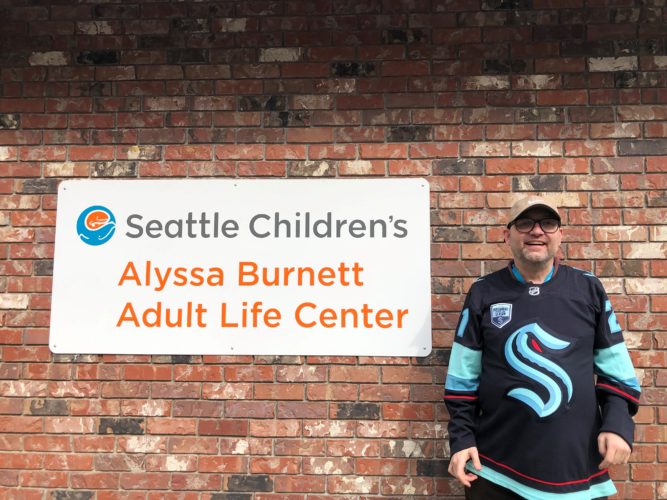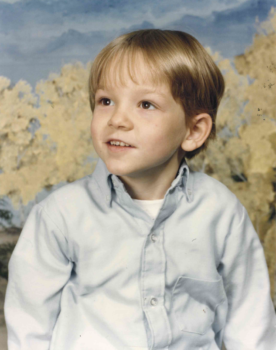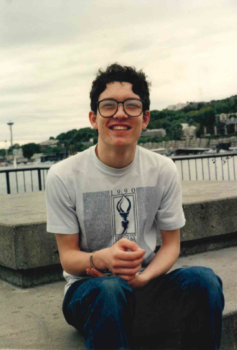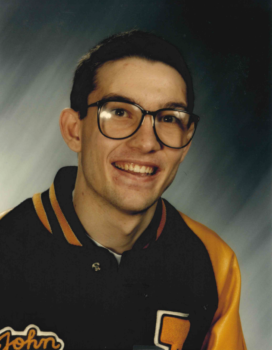Surviving to Thriving, a Self-Advocate’s View
April 11, 2022
We present guest author John Wennberg’s blog From Surviving to Thriving: What Autism Acceptance Means to a Self-Advocate in celebration of Autism Month.

What does autism acceptance mean to me? For me, it means finally accepting my diagnosis at the age of 40. It also means to stop masking (the act of trying to hide one’s autistic characteristics), because masking is denying.
The first time I heard the word ‘masking’ was when I was watching an Autism 200 Series video and I realized I was doing it, but I didn’t know what it is. Masking is a strategy that autistic people use for learning neurotypical behaviors and doing our best to copy them in social settings. I did it as a kid because I wanted to fit in with everybody, but now I know there’s a name. I was an honor student, so I was known for getting my work done perfectly and on time. I was involved in many school activities and sports, and I got my Letterman’s jacket. I loved choir, but I did these activities to fit in.
 As I was masking, I had a lot of other health problems that came my way. When I went into therapy and dealt with the trauma of my childhood, I realized that I needed to take the mask off and accept myself for who I am, and when I did, the health problems went away. I am a grateful member of the Fellowship of Al-Anon, and through the 12-step process and working with a sponsor, I have been able to uncover things that I never knew. Coming from the home of an alcoholic family and being affected by the family disease of alcoholism, I really understand what it’s like to be alone and be codependent, as well as how to overcome it. That’s part of masking. As soon as I came to accept myself, I realized that I came to accept and love others as well, because it starts off with me. There’s a slogan that says, ‘let it begin with me.’ The way I view that slogan is, that it starts with loving myself for who I am and then giving that unconditional love to other human beings and then the love of God.
As I was masking, I had a lot of other health problems that came my way. When I went into therapy and dealt with the trauma of my childhood, I realized that I needed to take the mask off and accept myself for who I am, and when I did, the health problems went away. I am a grateful member of the Fellowship of Al-Anon, and through the 12-step process and working with a sponsor, I have been able to uncover things that I never knew. Coming from the home of an alcoholic family and being affected by the family disease of alcoholism, I really understand what it’s like to be alone and be codependent, as well as how to overcome it. That’s part of masking. As soon as I came to accept myself, I realized that I came to accept and love others as well, because it starts off with me. There’s a slogan that says, ‘let it begin with me.’ The way I view that slogan is, that it starts with loving myself for who I am and then giving that unconditional love to other human beings and then the love of God.
Being involved at the Alyssa Burnett Center (ABC) has helped me in my journey to self-acceptance. When I first started as a student, I was on the verge of autistic burnout and wasn’t aware of it at the time. It was after I left a previous job, where I felt like I had to look over my back to see who was coming down the hall because I was full of fear. In fact, there were days when I felt like I couldn’t go to work. I finally came to the conclusion that it wasn’t the right place for me, so I turned in my badge and went home. Then the ABC opened and that’s where I first met Tammy Mitchel. At the time, I would go into the sensory room and immediately fall asleep in the rocking chair. One of the parents at the ABC was a health coach and nutritionist, and she worked with me on my diet and my coping skills.
 Then I met Dr. Gary Stobbe, after my former neurologist retired. He saw me as a patient. The first time I went to the Adult Autism Center at UW, I met with his nurse practitioner, and she had a list of counseling centers. Through that list, we chose the Center for Psychological Health (CPH) in Seattle. That’s where I met Josh Carter who was the first therapist who really helped me through the trauma that I was experiencing. After a couple of years, I now work with Dr. Garret Gilcrest and I still go to counseling at CPH. I can’t believe from the day when I first walked through their door how much I have changed. Before I was suffering from major depression and didn’t realize it, and as I came to work through my issues, I find that I am present a lot more and that I am able to love myself and others because of that. I never thought that what affected me as a nine-year-old would have me in this traumatic situation that I had to work through as I was becoming an adult. I believe that right now I can see the fruits of becoming an adult and don’t have to rely on others as often for help. I believe my friends at ABC see that in me too.
Then I met Dr. Gary Stobbe, after my former neurologist retired. He saw me as a patient. The first time I went to the Adult Autism Center at UW, I met with his nurse practitioner, and she had a list of counseling centers. Through that list, we chose the Center for Psychological Health (CPH) in Seattle. That’s where I met Josh Carter who was the first therapist who really helped me through the trauma that I was experiencing. After a couple of years, I now work with Dr. Garret Gilcrest and I still go to counseling at CPH. I can’t believe from the day when I first walked through their door how much I have changed. Before I was suffering from major depression and didn’t realize it, and as I came to work through my issues, I find that I am present a lot more and that I am able to love myself and others because of that. I never thought that what affected me as a nine-year-old would have me in this traumatic situation that I had to work through as I was becoming an adult. I believe that right now I can see the fruits of becoming an adult and don’t have to rely on others as often for help. I believe my friends at ABC see that in me too.
When I got started at the ABC I was involved in many activities as a student. I also have been a self-advocate for twenty years and have connections to the Developmental Disabilities Administration, the Division of Vocation Rehab, and others. There was a yearly summit I went to in Wenatchee that is open to families, advocates, and workers. When we go there, we take workshops that apply to our specific areas and then we come back with that information to our specific groups. That’s one of the things I have done over the years, not just for the ABC, but being on the DDA Advisory board for ten years. I am also a UW LEND fellow who has recently graduated the program in 2021. As I was going through that program, I learned a lot about myself and how to flex that advocacy muscle. Over time, as I was volunteering for this, I saw a job opening and applied. Now I am here at the ABC as a staff member!
At the ABC, we always celebrate autism acceptance. That has been our motto since we started. We don’t just celebrate acceptance one month out of the year, we do it all the time since that is the population we serve. We are always open to learning more about each other and instead of focusing on each other’s weaknesses, we focus on each other’s gifts, talents, and what each person has to offer. That’s something we are strong at doing at the ABC.
I feel included at the ABC by being welcomed in as a part of the group at large. I know that when I first started working there, I felt really welcomed by all of the staff and students. To have the support of my manager and supervisor, especially with accommodations, was huge for me.

I include others by always inviting them in as part of the circle. When I am assisting in classes, I know what my role is, and I also go beyond my role helping to teach and lead classes. I like to make sure that everyone in the room is included and not left out. I believe that as a society, we need to include everyone, no matter who we are or how different we look. We just need to accept each other as human beings. I have heard that we can stop using the word disability and use ‘with different abilities.’ There’s a song by Danny Deardorf called “Everyone’s Differently Abled” and the lyrics go something like this, “everyone’s differently-abled, everyone has ability, everyone’s differently-abled, making their lives work differently.”
If you are reading this right now and you’ve been masking yourself for many years, don’t be afraid to take the mask off and accept yourself for who you really are and to love yourself for who you really are. That way you’ll be able to give that love unconditionally to others. I know that that’s what I had to do. Trust me, this will make you feel a million times better. I promise you that.